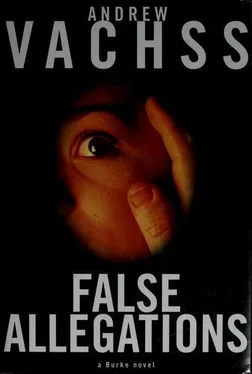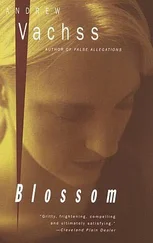"Yeah," he said slowly, waiting for the punch line. "You got a good memory, hoss."
"I got a case. A legit case," I assured him quickly. "And I think he's the man for me to talk to. Can you set it up?"
"I'm listening," Doc said, his wrestler's upper body shifting behind the cluttered desk, eyes homing in the way they did years ago when we first started talking. When I was inside the Walls. Telling me there better be more.
"I've been doing a lot of that myself—listening," I told him. "A girl says something happened. A long time ago. It happened, but she didn't know it. Or didn't remember it, anyway. Until now."
"Recovered memory?"
"That's what she says."
"And you say…?"
"I don't know what to say. That's the job—for me to say."
He leaned back in his chair, eyes still on mine behind the wire–rimmed glasses he always wears. "We go back a long way, Burke. You've spent more time studying child abuse than any Ph.D. I know. Your gut's as good as anyone's. What do you need Perry for?"
"He's a science guy, right? Hard science, not the blah–de–blah stuff."
"Like I do?" Doc asked. Not challenging me, just getting at it, the way he always did.
"What you do…it's only as good as the guy doing it, right?"
"Sure. Same as building a house. Or fixing teeth. Or playing the piano."
"But there's a truth somewhere, Doc. A true truth. Like the way they test for gold—you drop the chemicals on the metal and you see the truth."
"You think Perry's stuff is like that?"
"Don't you?"
"I'm not sure yet, hoss. Could be. Tell you what—I'll give him a call and tell him the truth. About you too, understand? He wants to go for it, that's up to him."
"Thanks Doc. I owe you."
"Yeah, right," he said, waving me out of his office.
The flight touched down at Houston International at two–thirty, on time even with the transfer from DFW—there were no nonstops out of New York and you couldn't pay me to fly out of Newark. When I got to the hotel, there was a note waiting for me at the desk.
"Hi! We're already here, me and Jennifer. It's all set up. Dr. Perry said to call him as soon as you're settled."
The handwriting was rounded, immature. Signed: "H."
"The best predictors of current functioning are past experiences. The most critical part of any evaluation, then, is getting a thorough, accurate history," the man said, smiling sheepishly as though he knew how pompous the words sounded. He was tall, well put together, with a frank, open face and thick tousled hair. Looked like a recruiting poster for North Dakota. "Childhood experiences have a grossly disproportionate effect on adult functioning…and those experiences are almost exclusively provided by adults."
"But what if the patient is the only source of that history, Doctor?" I asked him, watching my language, wondering what he'd been told about me. I'd already guessed the dress code wrong: I had on a dove–gray silk suit and a conservative tie; he was wearing a blue chambray shirt with the sleeves rolled up and a pair of weathered jeans over scuffed cowboy boots.
"It's doesn't matter. I would still look for a set of emotional or social characteristics in the family which would increase a child's vulnerability—those factors which make children feel isolated, inadequate, lonely, unattractive, incompetent… different ," he said, leaning forward, engaging me, telling me to ignore the heavy language and listen to the core. "A harsh, demanding, cold parent…an overwhelmed, depressed parent…absence of supportive extended family…social isolation…a parent who was raised abusively who hasn't come to terms with it—"
"Most families weren't the Brady Bunch," I said, cutting him off. I know there's always a price to pay for information, but I hadn't come all that way to listen to what I'd learned before this guy had been born.
"Sure," he replied, nodding. "But those factors tend to be transgenerational. It's rare to find an adult who was neglected, humiliated, unloved—made to feel worthless for whatever reason—who can easily provide optimal nurturing. You can't give something you never received."
"Yeah you can," I said, greeting his sermon with a flat prison–yard stare.
He was quiet for a minute. "You think I'm sugar–coating it?" he asked.
"I don't know what you're doing," I told him. "It sounds like you're telling me someone like Jennifer could be an easy target because—"
"Look," he said, cutting me off. "Not all stealth predators are successful. Many are rebuffed—"
"Stealth predators?"
"Those who don't use force. They operate from within what the child believes is a safety zone—they're always people the child has been told can be trusted—and they proceed in highly stylized ways. They would call it 'seduction.' We call it what it is: hunting."
"And some kids just blow them off?"
"A good many do just that, in one way or another. But if the child were reared in a highly competitive or consistently humiliating environment, if the child's primary caregiver was overwhelmed or emotionally distant, that child might be susceptible to what feels like…caring."
"So for the kid to be set up, he doesn't actually have to be abused?"
"Emotional abuse is as devastating as any other form, Mr. Burke," he said, his voice not open to argument. "And it leaves as indelible a physical scar on the developing brain as a brand would on the skin."
"So your mother telling you you're a piece of shit is the same as your father fucking you every night?"
"Children don't react to inputs the same way adults do," he said, turning aside my deliberately coarse language, waving his hand to tell me to wait until he was finished. "Let me put it this way: The nearer the target, the more damaging even the slightest blow can be. And when the target is the developing human heart…"
"You think that's what turned her into a puller?" I asked, trying to get him off the soapbox and on to the reason I came.
"The trichotillomania? Most likely. That's very primitive, self–soothing behavior. You remember your college psychology? The 'fight or flight' reaction?"
I nodded so he'd keep going. I guess Doc hadn't told him everything when he'd vouched for me. Me, I had what you'd call a lower education. But the tuition had been a lot more costly than college. Started much earlier too.
"Well, it's palpable ignorance to believe a baby has those options," Perry said, anger flashing across his handsome face. "When a baby is threatened, she can't fight and she can't flee. And when the threat actually induces terror , sometimes the only option is to run to a 'safe' place…to dissociate. Cut off the pain and threat from the outside world and stay inside. Deep inside. Dissociation is connected to a release of endorphins—you know, natural opiates—and the result is soothing, pleasurable. The inner retreat 'feels' good to the baby. It is, if you will, rewarding."
I thought about Fancy, a girl I knew a long time ago—Fancy telling me how the taste of the whip got all the endorphins racing through her brain. Made her feel good . But I didn't say anything, just shifted my body posture enough to let him know I was listening.
"And because the brain 'learns' from experience," Perry went on, "behaviors and emotions that result in 'reward' are repeated. Eventually, the child continues to seek that reward even if the original stimulus—the threat or the terror—isn't present. That's one of the keys to the survival of our species. Would it surprise you to know that those same biochemical 'rewards' can be released when a baby smiles at a woman holding her?"
"The mother gets an endorphin rush?"
"If you like," he said, ignoring my tone of voice. "The point is that the woman holding the baby is rewarded for the baby's smile…and seeks that smile the same way a terrorized child seeks safety. That's part of the reason why mothers protect their children. But that capability, it's only a genetic potential. If the caretaker herself was never fed or held, never nurtured or loved as an infant, those biochemical 'reward' systems in her brain don't develop to the maximum. So when her baby smiles, the 'reward' isn't as powerful. And she's not as impelled to seek it again."
Читать дальше











